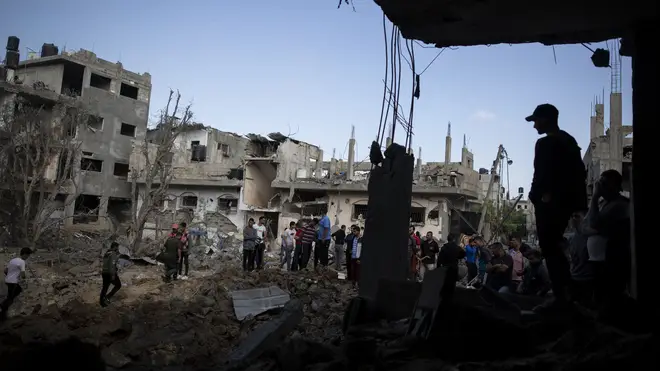
Matt Frei 10am - 12pm
14 May 2021, 18:04

The current violence is the fourth round of major conflict between Israel and Hamas since 2008.
The Gaza Strip was pounded this week by hundreds of Israeli strikes from sea, land and air, while the enclave’s militant Hamas rulers fired hundreds of rockets into Israel.
It is the fourth round of major conflict between Israel and Hamas since 2008, with the tiny enclave’s more than two million Palestinian residents bearing the brunt of the deaths and the destruction.
The latest eruption of violence has raised the spectre of another devastating war and once again drawn international attention to the impoverished, densely populated strip.
Here is a look at the Gaza Strip and its place in the Middle East conflict.
– A narrow coastal strip

Gaza, sandwiched between Israel and Egypt, is just 25 miles long and six miles wide. It was part of the British-ruled Palestine Mandate before the 1948 war surrounding Israel’s creation, when it came under Egypt’s control.
Large numbers of Palestinians who fled or were driven from what is now Israel ended up in Gaza, and the refugees and their descendants now number 1.4 million, accounting for more than half of Gaza’s population.
Israel captured Gaza, along with the West Bank and east Jerusalem, in the 1967 Middle East war. The Palestinians want all three territories to form their future state.
The first Palestinian intifada, or uprising, erupted in Gaza in 1987 – the same year Hamas was founded – and later spread to the other occupied territories. The Oslo peace process in the 1990s established the Palestinian Authority and gave it limited autonomy in Gaza and parts of the occupied West Bank.
– The Hamas takeover
Israel withdrew its troops and Jewish settlements from Gaza in 2005, after a second and far more violent intifada.

The following year, Hamas won a landslide victory in Palestinian elections. That triggered a power struggle with Palestinian President Mahmoud Abbas’s Fatah party, culminating in a week of clashes in 2007 that left Hamas in control of Gaza.
Hamas has done little in the way of imposing Islamic law on Gaza, which was already very conservative. But it has shown no tolerance for dissent, arresting political opponents and violently suppressing rare protests against its rule.
The militant group has remained firmly in power through three wars and a 14-year blockade.
– The blockade
Israel and Egypt imposed the crippling blockade after the Hamas takeover. Israel says it is needed to keep Hamas and other militant groups from importing arms. Rights groups say the blockade is a form of collective punishment.

The closures, along with years of misrule and Hamas’s long-running feud with the Palestinian Authority, have devastated Gaza’s economy. Unemployment hovers at around 50%, power outages are frequent and the tap water is badly polluted.
Palestinians face heavy movement restrictions that make it difficult to travel abroad for work, study or to visit family, and often refer to Gaza as the world’s largest open-air prison.
– The wars
Hamas and Israel have fought three wars and several smaller battles. The worst so far was the 2014 war, which lasted for 50 days and killed some 2,200 Palestinians, more than half of them civilians. Seventy-three people were killed on the Israeli side.
Israel’s air strikes and incursions into Gaza have left vast swathes of destruction, with entire neighbourhoods reduced to rubble and thousands forced to shelter in UN schools and other facilities. Israel says it makes every effort to avoid civilian casualties and accuses Hamas of using Gazans as human shields.

Palestinian militants have fired thousands of rockets into Israel. The vast majority are intercepted by Israeli missile defences or land in open areas, but they sow widespread fear and can bring life to a standstill. Their range has steadily increased in recent years, with some striking as far as Tel Aviv and Jerusalem, major metropolitan areas.
Earlier this year, the International Criminal Court (ICC) launched an investigation into possible war crimes in the Palestinian territories. It is expected to scrutinise the actions of both Israel and Palestinian militants in the 2014 war.
The ICC has also expressed concern about the latest violence.